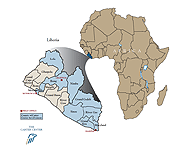A critical element of Liberia's postwar reconstruction has been to re-establish the rule of law. The country's 2008 Poverty Reduction Strategy (PDF) emphasizes the need to strengthen and enhance the effectiveness and integrity of legal and judicial institutions, stating that:
The justice system currently suffers from chronic capacity constraints. The lack of human, material, and financial resources has severely hampered the administration and delivery of justice. In order for justice to be served, those who administer justice must be properly trained, equipped, and resourced.
Since 2006, building on its long history of engagement in Liberia, The Carter Center has been implementing an access to justice project in Liberia in response to these critical needs and invitations by the government.
The Carter Center is working to build peace and prevent violence by helping the government ensure justice for all Liberian citizens, not just those who can afford it.
At the end of the war in 2003, the justice system was in ruins and its credibility in tatters. A lack of human, material, and financial resources severely hampered the administration and delivery of justice. A critical element of Liberia's long-term reconstruction, therefore, has been to re-establish the rule of law and rebuild trust in government. For justice to be served, citizens must understand and exercise their rights, and those who administer justice must be properly trained, equipped, and resourced.
At the invitation of the government, The Carter Center implemented an Access to Justice Project to help address these critical needs, particularly focusing on historically marginalized rural communities.
In the immediate aftermath of the war, the Access to Justice Project partnered with the Ministry of Justice to identify rural justice needs, develop and implement civic education messages, and fill immediate short-term gaps to strengthen the formal justice system.
Over time, this innovative project has expanded, partnering with government and civil society to deliver sustained impact. It currently works to strengthen the quality and accessibility of justice and prevent violence through:
Liberia is Africa's oldest republic, established in 1847 by freed American slaves who settled land on the west coast of Africa inhabited by indigenous tribes.
For more than a century, the country was relatively stable, but in 1980, the government was overthrown in a violent military coup. In 1989, the country descended into a brutal civil war that claimed the lives of an estimated 200,000 of its 2.5 million citizens.
A Comprehensive Peace Agreement in 2003 saw the exile of then-President Charles Taylor and the establishment of a transitional government. In 2005, Liberians chose Ellen Johnson Sirleaf as their president. With the help of the United Nations Peacekeeping Forces and others in the international community, Liberia began to rebuild, and in 2016, the U.N. formally returned responsibility for security to the government of Liberia.
Please sign up below for important news about the work of The Carter Center and special event invitations.
"A common finding is the high regard and respect held by respondents for The Carter Center for its exceptional personnel, its skill in working in the justice sector, and its talent playing the role of honest broker. This observation applied both to the highest levels of government and to citizens in rural communities." (USAID Evaluation, 2013)

View a Map of Liberian Counties with Carter Center Involvement (PDF)
Questions? Concerns? Please contact our program: